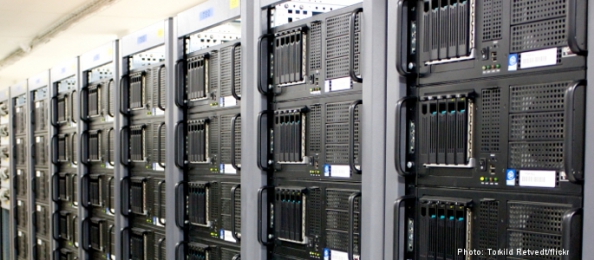The German Experiment
The German government has decided to phase out nuclear power without making any changes to its climate protection targets. This means that all of us will have to strengthen our efforts to achieve more energy efficiency by searching for additional potential that will enable us to reach the climate protection targets without relying on nuclear energy. There is no doubt about it: CO2 emissions will continue to rise globally. This fact makes us aware of the enormous responsibility that we have for the sake of the environment.
In 1995 Deutsche Telekom was the first DAX 30 enterprise to commit itself to climate protection by incorporating mandatory CO2 reduction targets for Germany into its company targets. We are fully aware of our corporate responsibility and have defined our own ambitious climate protection goals.
| Initiator | Deutsche Telekom AG |
| Project start | 2009 |
| Status | ongoing |
| Region | Germany |
| Contact person | Luis Neves |
| Awards |
Project benefit
- Decreasement of CO2 emissions.
- Hegher energy efficiency
| Anti-Corruption | - |
| Business & Peace | - |
| Development | - |
| Environment | X |
| Financial Markets | - |
| Implementing UNGC Principles in your Corporate CSR Management | X |
| Human Rights | - |
| Labour Standards | - |
| Local Networks | - |
| Advocacy of global issues | - |
| Business opportunities in low income communities/countries | - |
| Project funding | - |
| Provision of goods | X |
| Provision of services/personal | X |
| Standards and guidelines development | - |
For example, our climate protection strategy defined in 2005 stipulated that we must reduce our overall CO2 emissions by 20 percent in the period from 1995 to 2020. We have already met this goal and have therefore revised our targets – to reduce CO2 emissions by 40 percent by 2020. Neither the German government nor the European Union have such ambitious targets. And thanks to specific steps, we are on the right track toward reaching this milestone.
One of the steps Deutsche Telekom has taken is its Green Car Policy for ensuring sustainable mobility throughout the Group. By 2015 the CO2 emissions produced by new vehicles in the Group fleet in Germany should be as little as 110 grams per kilometer. In comparison, the European Union is demanding a reduction in emissions to 120 grams by 2015.
In the medium term, we plan to convert the remaining analog parts of the telephone network to IP technology for better energy efficiency and to make the entire German telephone network ready for the future.

Luis Neves, Group Climate Change and Sustainability Officer, has taken over from Dr. Ignacio Campino this position as of February 1, 2012.
Photo:
Deutsche Telekom AG
Internationalizing climate protection
Furthermore, we are currently working on internationalizing our climate protection strategy. Based on Groupwide targets, combined with identified potentials at the regional level, we plan to define individual reduction goals for our international subsidiaries.
Moreover, when making investments we look for options that are favorable to our climate protection criteria. In the future we also want to focus on CO2 emissions throughout the entire value chain of our products – from the extraction of natural resources to production processes and even the sale of our products and services to our end-customers.
Since 2009, both our new climate protection strategy and the internationalization of this approach have been led and monitored by the Climate Change Group, an in-house committee of experts. This project is being driven by Luis Neves, Group Climate Change and Sustainability Officer, in collaboration with the company’s Sustainability unit.
“Climate protection is one of the greatest challenges currently facing us all. As an ICT company, we have an opportunity to offer solutions for reducing CO2 emissions. These can help shape a more sustainable future for millions of people,” says Luis Neves, explaining his motivation for promoting climate protection even beyond company boundaries.
The great potential
A 2009 study sponsored by Deutsche Telekom, the German Federal Ministry of Economics and Technology, the Global e-Sustainability Initiative, the Potsdam Institute, SAP, Huawei, Siemens and the Boston Consulting Group to analyze potential savings in the field of information and communications technology (ICT), entitled “SMART 2020,” summarized the opportunities available to our industry as follows: In Germany alone, telecommunications companies could save some 13 metric megatons of CO2 emissions by the year 2020, solely as a result of direct savings from its own business activities. These include savings from energy-efficient data centers, virtualization or cloud computing, and energyefficient terminal equipment.
If implemented sustainably and consistently, as an “enabler” the ICT industry could even achieve a potential reduction of up to 194 metric megatons of CO2 emissions over the next eight years. This is equivalent to cutting Germany’s total emissions by up to 25 percent. Worldwide, the figure is 7.8 gigatons of CO2 equivalent by 2020, equivalent to 15 percent of total emissions under the “business as usual” scenario. The identified indirect reduction potential is a theoretical maximum, and the business value of this potential is estimated at up to €84 billion by 2020 for Germany alone.
As one of the world’s largest telecommunications providers, we recognize that we have an obligation and the potential to offer climate-friendly products and services to our customers, and to give them the opportunity to make their own contributions to climate protection. Services such as our web, video, and telephone conferencing services support easier communications regardless of location, can help to streamline work processes, and are far more sustainable than physical meetings that entail travel by air, car, or rail.
In an era where flexible working plays an increasingly important role (at our company as much as elsewhere), we give our customers the opportunity to be anywhere at any time, without the need for a time-consuming, climatedamaging journey.
In our strategy, we have broadened the business base of our company and anchored sustainable topics such as climate protection. The growing energy business is one such example: Developing smart grids and using smart metering is a way of helping to cut CO2 emissions. As electricity meters, for example, are capable of sending their readings to the power providers at any time, travel by meterreading personnel becomes superfluous.
At the same time, we are making electricity consumption more transparent and efficient for our customers, and thereby actively helping them to save both electricity and money.
This is more than just a way of easing our green conscience. Using “green” innovations can also impact a lasting reduction in operational expenditure. The ability to not only combine but to proactively link climate protection and corporate success with a consistent reduction in operational expenditure is indicative of our company’s future viability.
Climate protection and the phasing out of nuclear power pose a huge challenge for us all. The German Experiment – together, we can make it a success.
Deutsche Telekom is one of the world's leading integrated telecommunications companies, with approximately 129 million mobile customers, 36 million fixed-network lines, and more than 16 million broadband lines.
It provides fixed-network/broadband, mobile communications, Internet, and IPTV products and services for consumers, and information and communication technology (ICT) solutions for business and corporate customers.
Deutsche Telekom is present in around 50 countries. With a staff of some 236,000 employees throughout the world, it generated revenue of EUR 58.7 billion in the 2011 financial year, over half of it outside Germany.
So that it can continue to be successful, it is already evolving from a traditional telephone company into an entirely new kind of service company. Its core business, i.e., the sale of networks and connections, remains the basis. But at the same time Deutsche Telekom is proactively committing to business areas that open up new growth opportunities for it.
Luis Neves, Group Climate Change and Sustainability Officer, has taken over from Dr. Ignacio Campino this position as of February 1, 2012.
Write a comment about this page
Your comments are provided by your own free will and you take sole responsibility for any direct or indirect liability. In order to maintain the highest discussion quality, all comments will be reviewed by our editors. You hereby provide us with an irrevocable, unlimited, and global license for no consideration to use, reuse, delete or publish comments in accordance with our Community Guidelines.
0 Comments
About Us // Privacy Policy // Copyright Information // Legal Disclaimer // Contact
Copyright © 2012-2018 macondo publishing GmbH. All rights reserved.
The CSR Academy is an independent learning platform of the macondo publishing group.









